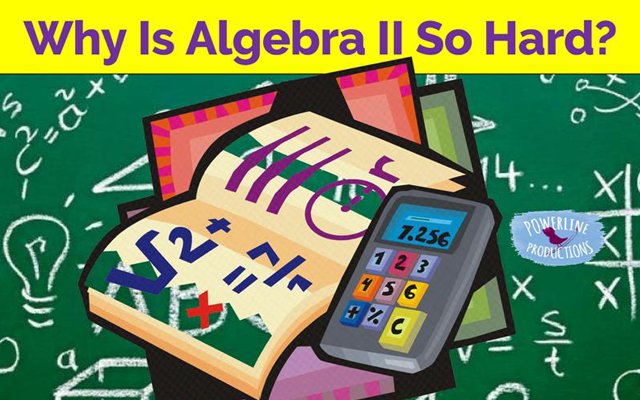Why Is Algebra II So Hard?


Your teenager has breezed through math all his life and suddenly he hits a wall: Algebra II. He is discouraged and doesn’t want to do math anymore.
What can you do to encourage him?
When I speak on high school at homeschool conventions and workshops, at least one parent confides in me afterward that their “A” Math student is suddenly struggling to understand Algebra II.
Why oh why is Algebra II so hard for so many high school students?
My Experience With Algebra II
Several of my children breezed merrily through Algebra II, but then we hit a snag. My daughter completed a whole year of Algebra II and felt lost. We changed curriculum, got a tutor, and she was able to finish up high school with pre-calculus.
Why Does Algebra II Seem So Hard?
In Algebra II, teens encounter the following:
- Complete the Square
- Solve the Quadratic
- Conic Sections
- Irrational Numbers in the Denominator
- Logarithmic Functions and Exponents
Wait! I just lost some of you! Hold on. Let me sum this up, Algebra II introduces new things that are based on knowing, understanding, and being able to work with a variety of math from the past. It’s not only learning new things, but combining old things together in ways that students may have never experienced.
One thing I discovered with students who struggle with Algebra II is that there is something from past math courses that they never quite got, especially working with decimals and fractions. In tutoring Algebra II, my friend Leanne often has to go back and review mathematical concepts from 5th or 6th grade.
Why Don’t They Remember?
In Math, it’s not just important to understand the concepts, you have to be able to apply them successfully.
That’s three things. Understanding. Doing the Problem. And getting the answer right.
If children don’t fully understand the concept like dividing fractions, but manage to figure out the answers in the lower grades, they feel lost when they have to divide fractions in a more difficult equation. They can no longer fake it.
Children can also do the problem correctly, but just make a simple arithmetic error veering them off course in the equation.
Remember That Math Is Incremental
Remember that unlike history, literature, and science, math is incremental. You must master certain concepts before you can learn the next tier of concepts. If you are only understanding 80% of 4th grade math, you will not fully understand 5th grade math. That’s why many curricula use reviews and drills.
Many of the teens I know that have struggled with Algebra II needed a month or so review of decimals, fractions, or both.
However, when it comes to higher math, some students need a person to step in.
Some Students Need A Math Teacher or Tutor
If you are like me, you are able to help your children up through Algebra, reviewing the book when necessary, but after Algebra and Geometry, I have to send my children to older siblings or my friend Laura who loves math. You see, I don’t remember everything so I don’t want to confuse them more.
There are so many people who need to watch a person write out problems and walk them through the process, even though the book does the same thing. Some teens need video courses and others need a tutor. Some high school students dual enroll for math to have a teacher to explain it and be able to attend collage math labs.
Above all, students need encouragement. Learning algebra II is attainable. Cheer your children on, remind them how smart they are, and find a way to troubleshoot the problem holding them back. Often, it is something quite fixable.
Preparing Younger Students for Algebra II
So, what can you do with your younger children in elementary and middle school to prepare them for a seamless and successful transition to Algebra II?
Here are some practical tips:
- Make sure students understand new math concepts
- Be consistent in doing math daily or at least four times a week
- Check math work and have children correct all problems
- When children get a problem wrong, ask them if they understand why they got it wrong and help them understand
- Play math games
- Be positive about math. It can be fun!
My friend Laura and I did a podcast on this topic. You can listen to it here: https://ultimateradioshow.com/algebra-2-hard/
Until next time, Happy Homeschooling,
Meredith Curtis, homeschooling mom, writer, speaker, and publisher, loves to encourage families in their homeschooling adventure. She is the author of Joyful and Successful Homeschooling. You can check out her books, curricula, unit studies, and Bible studies at PowerlineProd.com. Free Reading Lists for all ages are available at JSHomeschooling.com. Read her blogs at MeredithCurtis.com (http://www.meredithcurtis.com/blog) and PowerlineProd.com and listen to her at Finish Well Radio.













































